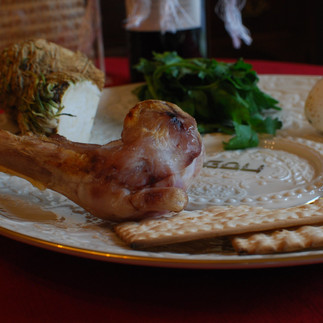Time to Get Kosher!
- Felicia Robinson, CEO

- Apr 15, 2022
- 4 min read
As personal assistants and professional organizers, we work with people from all walks of life to relieve stress and states of overwhelm. Recently, I had the honor of helping a local Jewish family, prepare their home to host a large Orthodox Passover Seder. Which if you know— you know. It’s a huge undertaking to abide by the strict kosher protocols and to cook for so many people. I jumped at the chance to help and learn more.

My client, who is an incredibly dedicated, busy mother and wife, taught me the whole process of “turning over.” She had separate bins stored in the garage with all of her cookware and utensils for preparing meals just for Passover. There was a bin for cooking Parve (coded green for non animal products), a bin for cooking dairy (coded blue) and a bin for cooking meat (coded red). I set up some large folding tables in the garage and unloaded each of the bins onto the tables so an inventory list could be created.

She explained to me the reasoning behind keeping dairy and meat separate. “It has to do with respect for the animals… that it is cruel to cook or eat an animal in the very milk that was intended to nourish it,” she said. According to Kabbalah, meat represents gevurah (the Divine attribute of Judgment) and milk represents chesed (the Divine attribute of Kindness). These two opposing characteristics are not to be mixed together; through cooking or by consumption.
“We are even supposed to empty out our purses and clothing pockets to make sure no dirt or breadcrumbs are left behind,” she said. Any trace of leavened bread must be removed in the home to prepare for Passover. The biblical narrative relates that the Israelites escaped Egypt in such haste that they could not wait for their bread dough to rise, so they brought flat bread with them instead. On the one hand, matzah eaten during Seder represents redemption and freedom. On the other, it’s also referred to as ”poor man's bread,” serving as a reminder to be humble and to never forget what slavery was like.

After taking inventory, I began to wash all of the parve, dairy and meat cookware and utensils. A separate sink from the main kitchen was used, along with brand new liquid soap and 3 sponges designated for each category. Each time a batch was finished, it was laid out on the kitchen table to dry on an absorbent disposable table cloth. I then drained and cleaned the sink out and refilled it with fresh, hot soapy water for the next cookware category.
I was absolutely fascinated by the process and the symbolic nature of every act. I found myself steeped in ritual during what some would consider a mundane task. I had no idea the amount of work that went into preparing the home, cookware and food so that everything remains kosher. As I dried each cookware item, I stacked like with like on separate shelves on a unit near the kitchen. Next to it was another shelving unit for all of the kosher food items that would only be used to create meals during Passover. As I unpacked and organized all of the beautiful kosher food items I was flooded with memories of when I was five years old and attended my very first (and only) Seder meal.

Growing up, our family friends had an apartment not too far from us and invited us over to join in their seder meal one year. When we arrived we were greeted with big smiles and such hospitality and warmth. I remember being entranced by the table placement and all of the unique dishes and food items on the table. As the ceremony began, I could sense the solemn discipline and how it created such a thick air of sacredness in that small apartment dinning room. Even at my young age, it was palpable.

I was excited to do something new and was absolutely fascinated by the reverence of Passover… the Hebrew blessings, the lighting of the candles, the pouring and drinking of the wine, the washing of the hands and the ceremonious dipping, breaking and nibbling of special foods on special plates. Everything was explained and every single act had some greater meaning. Some greater purpose… just like my small acts of service during this job. It holds a much greater meaning.
All of these tasks that we do at Felicia’s Best may seem menial. However, handling these tasks for our clients has such an amazing impact on their lives and emotional states. I know that the “turning over” I did for this family will ensure that they have a Passover that is simpler and filled with ease. And that brings me so much joy. There is so much sacredness in order and all of us at Felicia’s Best strive to remove that weight from your shoulders.
-Chag Sameach!

Written by Emily Jones,
Team Member and Lead, Felicia's Best Personal Assisting



























Comments